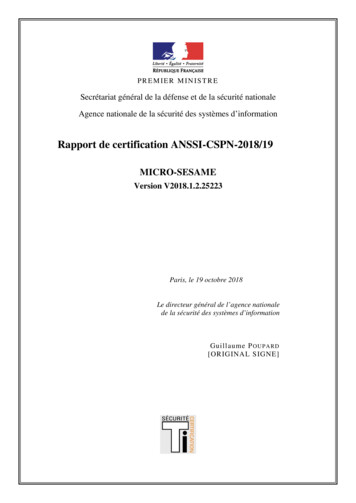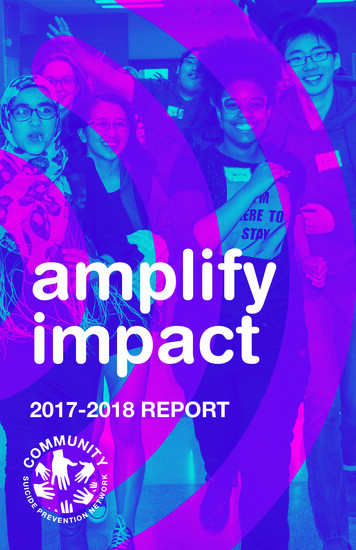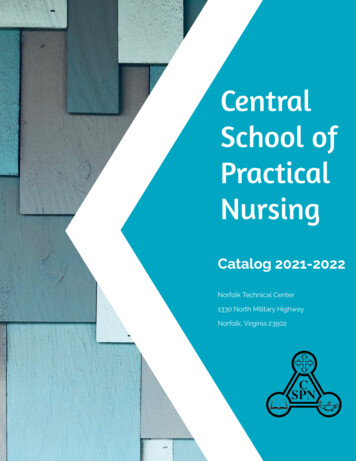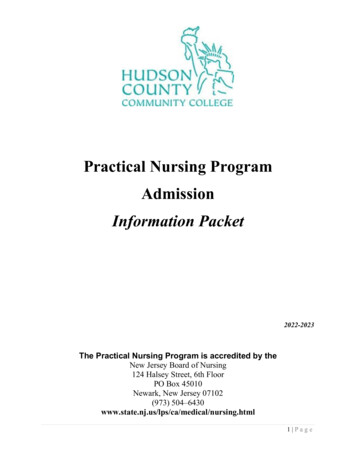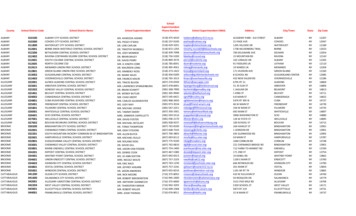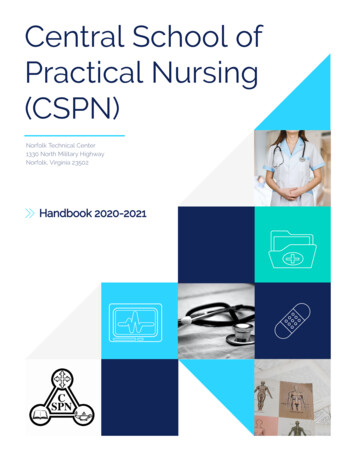
Transcription
Central School ofPractical Nursing(CSPN)Norfolk Technical Center1330 North Military HighwayNorfolk, Virginia 23502Handbook 2020-2021
WelcomeWelcomeDear Student,The nursing faculty of Central School of Practical Nursingwelcomes you to the practical nursing program. It is our hopethat this program will provide you with many learningexperiences that will assist you in preparing for a nursing careerand offer you great personal satisfaction. On the pages to follow,you will find a description of the program and its operation.Nursing is a challenging, but rewarding, profession. By holdingyourself personally accountable to the policies and regulations ofthe program, you are ensuring that you will attain thoseoutcomes that will prepare you for the valued profession ofpractical nursing.We wish you well as you embark on your newly chosen course ofstudy and offer ourselves as resources whenever you need us.The CSPN Faculty02Norfolk Public Schools does not discriminate on the basis of age, religion/creed, ethnic/nationalorigin, marital status, race, gender/sex, disability, or veteran status.
This is your student handbook. It contains all the information you need to be a successful student in the CentralSchool of Practical Nursing. Please keep it handy as all the rules and regulations of the school and its practices arecontained within. Each student is held responsible for reading, understanding, and observing these policies duringthe program.Signature PageSignature PageThe school is in compliance with the Civil Rights Act. Age, religion/creed, ethnic/national origin, marital status, race,gender/sex, disability, or veteran status is not used in the admission or evaluation of students or in any aspect of thefunctioning of the school.The school reserves the right to change policies as needed, without prior notification, and these changes maybecome effective immediately. Changes will be announced, posted on bulletin boards in the classroom, and emailedto each student.After attending orientation and reading the Student Handbook, each student must sign the following statement andturn it in to your instructor for placement in your academic record.“I have read and understand the materials included in the Student Handbook and have had my questions answered. Iagree to abide by the policies while a student in this program. I understand that noncompliance with these rules,regulations, and procedures is the basis for disciplinary action up to and including dismissal from the program.”Student’s signature DateCentral School of Practical Nursing abides by an Honor System. Students are expected to do their own work andreport any suspicious behavior to the instructor. Cheating in any form (copying, plagiarism*, texting, sharing officialdocuments, etc.) is strictly prohibited and will result in disciplinary action up to and including dismissal of thestudent(s) involved. All students are held to a high standard of conduct with respect to integrity, ethical behavior, andaccountability. Students who do not report dishonest or unethical behavior are as guilty as those who behave in thatmanner.Please sign the statement below, indicating you have read the Honor System information and turn it in to yourinstructor for placement in your academic folder.“I have read, understand, and accept the concepts as stated in the Honor System. I pledge to abide by them while astudent in this program. I understand that noncompliance with the Honor pledge is basis for disciplinary action up toand including dismissal from the program.”*knowingly furnishing false information.Student’s signature Date03
Academic Calendar . . . see websiteDefinition of Practical Nursing. . .5Code of Ethics . .5Goals of Program . . 7Philosophy.8-9Student Learning Outcomes.10Conceptual Framework .11Curriculum Plan.12Student Support Services .13-14Table of ContentsTable of ContentsSchool Policies:Criminal Background Check . .15Admission & Health Requirements . 16-18Tuition, Fees and Refunds . . .18-20Appeal Procedure .20-22Attendance .22-27Communication . . . 27Conduct . . .27-30Confidentiality . . .30Core Performance Standards . . .30-31Dress Code . . .32-33Employment . . .34Fire Safety .34Grading Scale and Procedures .34-36Graduation .37Honor System . .38Maternity .39Progression . .40-43Readmission .43-44Records .45Student Organization .46Vacation and Holidays .46Inclement Weather .46Withdrawal from Program .47Program Evaluation . . 48General Information . . 49-50Financial Aid . . .separate handout04
Definition of Practical Nursing“Practical Nursing” or “Licensed Practical Nursing” means the performance for compensation ofselected nursing acts in the care of individuals or groups who are ill, injured, or experiencingchanges in normal health processes; in the maintenance of health; in the prevention of illness ordisease; or subject to such regulations as the Board may promulgate, in the teaching of thosewho are or will be nurse aides. Practical nursing or licensed practical nursing requiresknowledge, judgment, and skill in nursingprocedures gained through prescribed education. Practical nursing or licensed practical nursingis performed under the direction or supervision of a licensed medical practitioner, a professionalnurse, registered nurse or registered professional nurse or other licensed health professionalauthorized by regulations of the Board.Let’s Elaborate “Practical Nursing”Let’s Elaborate “Practical Nursing”The term humanresources wasCommonwealth of VirginiaBoard firstof Nursingcoined inStatutes and Regulationsthe 1960s54.1 – 3000Code of EthicsDuring his/her development as a health professional, the student nurse learns the professionalcode of ethics. Practical Nurses have 2 organizations that develop these professional standards theNational Federation of Licensed Practical Nurses (NFLPN) and The National Association of PracticalNurse Educators (NAPNES)NFLPN“Each Licensed Practical/Vocational Nurse, upon entering the profession, inherits the responsibility toadhere to the standards of ethical practice and conduct as set forth in this code.The Licensed PracticalNurse shall:1. Know the scope of maximum utilization of the Licensed Practical Nurse and function with this scope.2. Recognize and appreciate cultural backgrounds and spiritual needs, respecting the religious beliefs ofindividual patients.3. Safeguard the confidential information acquired from any source about the patient.4. Refuse to give endorsements to the sale and promotion of commercial products or services.5. Uphold the highest standards in personal appearance, language, dress, and demeanor.6. Accept responsibility of membership in the National Federation of Licensed Practical Nurses andparticipate in its effort to maintain the established standards of nursing practice and employment policiesconducive to quality patient care.”(NFLPN, .nflpn.org/practice-standards
1.2.“Consider as basic obligation the conservation of life and the prevention of disease.Promote and protect the physical, mental, emotional and spiritual health of the patient andhis family.3. Fulfill all duties faithfully and efficiently.4. Function within established legal guidelines.5. Accept personal responsibility for (his/her) acts and seek to merit the respect andconfidence of all members of the health team.6. Hold in confidence all matters coming to his/her knowledge, in the practice of his/herprofession and in no way and at no time violate this confidence.7. Give conscientious service and charge just remuneration.8. Learn and respect the religious and cultural beliefs of his/her patient and of all people.9. Meet his/her obligation to the patient by keeping abreast of current trends in health carethrough reading and continuing education.10. As a citizen of the United States of America, uphold the Laws of the Land and seek topromote legislation which shall meet the health needs of its people.” (NAPNES, 2004)Let’s Elaborate “Practical Nursing”NAPNES:The term humanresources wasfirst coined inthe 1960sReference:http://www.napnes.org/standards06
1.To provide a program of learning, infused with legal, ethical, and cultural responsibility, that developsboth professional and social skills needed to become a successful, productive contributor of society.2.To provide a teaching-learning program that recognizes the individuality of a student and uses avariety of educational strategies to develop competence.Goals of the ProgramGoals of the Programa. CNA pass rate will be 85%.b. Graduation rate will be 60% of those students who enroll in Level II.c. Graduates will agree ( 3 on 4 point Likert scale) that classroom and clinical experiences enabledthem to meet Student Learning Outcomes and develop competence.3.To foster an awareness of the health needs of the community/society and one’s responsibility to thehealth care team.4.To partner with community agencies to provide educational experiences for students and health careservices for patients.5.To graduate a beginning practitioner who is competent to assume an entry level nursing position andfunction within a variety of health care settings.a.NCLEX-PN pass rate will be national pass rateb.90% of CSPN graduates seeking employment as LPN are employed within 6 months of graduation(or they have returned to school).c.90% of seniors completing the End of Program Survey will agree that they met student learningoutcomes, that the program prepared them to take NCLEX-PN, and that the program prepared them forentry level practice as a practical nurse.d.90% of graduates completing the One Year Follow Up Survey will agree that they met studentlearning outcomes, that the program prepared them to take NCLEX-PN, and that the program preparedthem for entry level practice as a practical nurse.e.90% of employers completing the Employer Survey will agree that CSPN graduates met at least10 professional behaviors, met the student learning outcomes, and provide satisfactory performance.6.To promote continual learning and advancement within the profession by encouraging andfacilitating articulation to RN programs.07
The philosophy and educational outcomes of the Central School of Practical Nursing are consistent with thephilosophy of Norfolk Technical Center. The faculty accepts and is committed to the following beliefs:Program PhilosophyProgram PhilosophyPERSON – Person is a bio-psycho-social-spiritual-cultural-ethnic being. This unique, complex being is in aconstant state of adaptation to external and internal stressors. Inherent in the individual is his right to makedecisions regarding his well-being.SOCIETY – Society is a multi-cultural complex group of people composed of many subgroups withdifferences and commonalities functioning within the democratic process.HEALTH – Health is viewed as a dynamic state measured on a wellness-illness continuum. When maneffectively adapts to stressors, a state of wellness exists; as adaptive mechanisms fail, illness results.NURSING – Nursing is a profession based on scientific principles in which the practitioner assesses, plans,implements and evaluates a holistic plan of nursing care for individual clients and families using preventive,therapeutic, supportive and rehabilitative measures. Nursing interventions, based on collected data, areadministered according to the position of the client on the wellness-illness continuum. Nursing advocatesfor and helps individuals to regain or maintain their optimal state of health and to maintain their individualdignity.PRACTICAL NURSING – Practical Nursing is a vocation and an integral part of nursing in which thepractitioner, utilizing the nursing process under the supervision of a qualified health professional, isexpected to recognize and meet health care needs of individuals by:(providing direct care in stable nursing situations(performing nursing functions in semi-complex and complex situations(promoting personal and community healthpromoting and carrying out preventive measures in community health facilities08
TEACHING-LEARNING PROCESS – The faculty believes that citizens prepared for gainful employment areamong our country’s greatest resources. The teaching learning process, based on educational concepts, is anProgram PhilosophyProgram Philosophyorganized and continuous plan for learning that will affect all facets of the life of the individual. Realizing thateach student is uniquely endowed with potential for learning, the faculty accepts the responsibility forproviding a competency-based education program, the components of which proceed from simple tocomplex. New learning experiences are based on previously acquired concepts. The teaching-learningprocess places the student in the center of the learning process and provides opportunities for him to havethe responsibility and accountability of planning, implementing, and evaluating his learning. The studentparticipates in activities by which knowledge, skills and attitudes are acquired, resulting in the expansion of hiscompetence.PRACTICAL NURSING EDUCATION – Practical Nursing education is a planned course of study in a technicaleducation setting. The faculty believes that knowledge, skills and attitudes can best be developed throughthe correlation of theory and clinical practice and enhanced through the use of technology. Planned learningexperiences should prepare the graduate to function safely and effectively as a beginning practitioner ofpractical nursing. The faculty assumes the responsibility for assisting students in identifying and meeting theirpersonal objectives and attaining the objectives of the program.EDUCATION AS A LIFE-LONG PROCESS – Believing that education is a lifelong process, the facultyencourages the practitioner of practical nursing to assume responsibility for continuous professional growththrough active participation in continuing education programs and nursing organizations. The faculty alsorecognizes its responsibility for continuing self-growth and development as individuals and as a group.09
ProfessionalismDemonstrate professional behaviors of accountability, professionalism, and leadershipwhile developing competence for practice.Student Learning OutcomesStudent Learning OutcomesCommunicationUse effective communication techniques and interpersonal skills to establish therapeuticrelationships with clients and collaborative working relationships with members of the HCT.Nursing ProcessUse the nursing process to provide competent and evidence-based nursing care tomeet health needs of patients across the lifespan and in varied settings.Critical ThinkingEngage in problem solving and critical thinking, based on analysis of collected data,to achieve health outcomes for clients and families.Caring BehaviorsProvide dignity and respect for clients and families from diverse backgroundsthrough the use of safe, ethical, legal, and culturally sensitive interactions.ManagementManage client care through efficient and effective use of time and resources.10
11The table below presents a visual of the framework on which the CSPN curriculum is based.Concepts come from the Philosophy.Curriculum concepts flow from the philosophy and are the building blocks of the curriculum andthe basis for the Student Learning Outcomes.Curriculum threads are the skills by which students attain the Student Learning Outcomes.Conceptual FrameworkConceptual Framework
12A diploma is awarded for successful completion of this program of study. Any acceptance of coursework orprogram completion by another institution is at the sole discretion of that institution.Conceptual FrameworkCurriculum Plan
Nursing Program Clerical Support - receives all incoming calls, catalogs and application packages toperspective students, and schedules preadmission testing. She manages student records, maintainstranscripts, and collects fees and tuition payments. Hours of operation are 7 a.m.-3 p.m.Student Support ServicesStudent Support ServicesProgram Leader - is available to all students. She secures clinical sites. She revises all published materials(catalogs, handbook, etc.), provides an orientation to the nursing program, counsels students about academicprogress, assists with Financial Aid, and conducts exit interviews regarding withdrawal/ dismissal/probationfrom class/program. She prepares students for licensure. Hours of operation are 7:30a.m -4 p.m.Course Faculty – provide for classroom and clinical instruction, academic advisement and counseling withstudents, and work with employers to coordinate employment opportunities for students. Hours of operationare 7:20 a.m. - 2:40 p.m., unless in clinical.Financial Aid Advisor – assists students with pursuing eligibility for selected financial aid opportunities.Available by appointment: see Liaison for contact number. Students in the practical nursing program may beeligible for:Title IV Funding (Pell Grant). Eligibility for Pell Grants is determined by a process that begins withcompleting a FAFSA, available at www.fafsa.ed.govVeterans Educational Assistance Program. Eligibility for veterans and their dependents is determinedthrough a process conducted by the Veterans Administration.Individual Training Account (ITA). Eligibility is determined by a process conducted by Opportunity Inc.,Hampton Roads’ Workforce Development Board.Notary Public – Mrs. Tillery, Office Manager, and Mrs. Fleetwood, Liaison to Nursing Program, are available toassist students with notarizing documents. from the hours of 7 a.m. to 3 p.m. daily.Main Office hours- 7 a.m.-3p.m.13
Placement Services - Faculty and the Program Leader invite representatives from local health care agencies,which hire practical nurses, to speak to the nursing students during their last course. The faculty assistsstudents with writing resumes and preparing to interview for jobs. Faculty may provide references uponrequest. Students complete a 72- hour preceptor rotation during the final clinical course. This provides aunique opportunity for employment if openings are available. While no graduate is guaranteed job placement,Student Support ServicesStudent Support Serviceseach graduate is afforded many opportunities to explore local jobs that are available.Counseling/Academic Advisement - Counseling is a necessary aspect of an individual’s development fromstudent to professional. This process gives the student the information he/she needs to deal with academicand personal concerns, to solve problems and to select courses of action. Students are encouraged to seekthe assistance of an instructor or the Program Leader especially during the first three months of the programwhen adjustment to a new environment and heavy schedules may prove difficult. An individual conferencewith an instructor may very well establish the support, guidance and direction needed by that student duringthe adjustment to the program. Counseling must be conducted in private without potential risk of studentexposure to the public.The objectives of the faculty in their role as academic advisors are to assist students inplanning and adjusting to the practical nursing program and academic issues.increasing self-awareness and the development of realistic goals.developing a healthy self-concept and desirable human relationships. developing skills needed to consider alternatives when making decisions. reviewing personal, behavioral, and emotional problems within the limits of the abilities of the facultymember and to make appropriate referrals when indicated.Counseling with students will be ongoing, as in clinical conferences, scheduled evaluations, or spontaneousconversations, where students will be informed of their progress and growth in the program and will beencouraged to become self-directed and to evaluate their performance effectively. Counseling sessions willprovide opportunities for faculty to role model positive adult interpersonal relationships with students, whiledeveloping and maintaining good teacher-student rapport Toward the end of the program, faculty will assiststudents in preparing for employment as a licensed practical nurse. The School Counseling Department atNTC is available to practical nursing students requesting further counseling. Mrs. Lisa Weber is NTC’sstudent exposure to the public.14Guidance Counselor. ( 7:15 am to 2:45 pm.). Counseling will be conducted in private without potential risk of
ADMISSIONS REQUIREMENTSCRIMINAL BACKGROUND/SEX OFFENDER CHECKSSchool PoliciesStudent Support ServicesAll candidates must complete the criminal background/sex offender screening process required by theaffiliating clinical facilities. The candidate is responsible for the cost, which is 20, payable by money order tothe Department of State Police. The nursing program clerical support person will provide each student withthe application form and instruct him/her through the process. Adult applicants complete the processfollowing the interview and the secondary students do so following completion of the TEAS testing.Final acceptance into the nursing program is contingent on the return of a “negative” report. Positive reportsare handled by the Program Leader on an individual basis, in accordance with the regulations of the VirginiaBoard of Nursing, clinical facilities, and may result in not accepting or rescinding acceptance.HEALTH REQUIREMENTSCSPN, as part of Norfolk Technical Center and Norfolk Public Schools, does not offer student health services.Health care services are available to students, at their expense, at local physician offices, urgent care centers,or emergency rooms. At the beginning of the CSPN program, students are required to sign a form indicatingwhether or not they have health insurance. All students are encouraged to carry health insurance.At NTC, students in all programs are instructed in safety, especially when they handle equipment which couldinflict injury to themselves or to others. All safety precautions are taken to prevent accidents; however,accidents do occur occasionally. Norfolk Public Schools offers accident insurance for students who wish topurchase it, which covers the student at school, on the way to and from school, and at all school sponsoredactivities. This insurance is optional; parents are required to sign a form indicating rather or not they wish topurchase the insurance.For accidents/serious complaints, parents are notified to arrange for the student to be transported to anappropriate agency for care. In the case of a serious injury/illness, the Principal will call the paramedics andthen the parent/guardian. Post-secondary students are responsible for their health care needs whether inschool or clinical. Once clinical rotations begin, neither NTC (CSPN) nor the cooperating clinical agenciesaccepts financial responsibility for treating students.15
Prior to enrollment, students accepted into CSPN sign the Core Performance Standards, indicating that theyunderstand and accept the physical requirements necessary to meet program expectations. By SeptemberSchool PoliciesSchool Policies15th semester of the first year, students submit a health form that includes a physical examination by ahealthcare provider and selected immunizations. The healthcare provider is provided with the CorePerformance Standards as part of the Physical Form. In addition, when a student is out of school for a periodof time, the healthcare provider must sign a Release Form for the student to return to school. The CorePerformance Standards are part of that Release Form.Physical Examination Form completed within the past six months by his/her health care provider, statingthat the student is in good health and free of communicable disease. The Core Performance Standards areattached to the Physical Form.Tuberculin Test (PPD) – Annual PPD is required on admission. In level II 2nd step PPD (minimum of 2 weeksapart). If a PPD is positive, a chest x-ray is required with doctor’s clearance of active TB.Immunizations required with the examination:Tetanus-diphtheria (Td) - within the last 10 years.Oral Polio - verbal history of polio immunization (if applicable) is acceptable.Measles, Mumps, Rubella (MMR) – Two (2) doses of live vaccine, given at least 30 days apart, or a positivetiter (of each) to demonstrate immunity.Varicella (chicken pox) vaccine (Varivax) – Two (2) doses of live vaccine, given at least 4 to 8 weeks apart, ora positive titer demonstrating immunity. A verbal history of having the disease as a child requires a positivetiter to demonstrate immunity.Influenza – An annual flu shot, due by November 30th.Hepatitis B - vaccine series is strongly encouraged. Three (3) doses of Hepatitis B Recombinant Vaccine orpositive titer demonstrating immunity, or waiver. If the vaccine has not already been given, documentationof the first dose should occur at the time of the physical. It is the student's responsibility to obtain the 2ndand 3rd doses as scheduled. Students who elect not to receive the vaccine must sign a waiver; however,this is discouraged due to the risk of exposure.Other recommendationsA Pertussis vaccine (Tdap) is recommended if more than 2 years has lapsed since the last Td immunization.16
It is the student’s responsibility to maintain a current PPD and CPR certification throughout the program.Documentation of updates is given to the Program Secretary. The student will not be allowed in class until allSchool PoliciesSchool Policiesrequirements are submitted by due dates. (Level I, September 15th and Level II, August 15th)If a student becomes ill in class or clinical, the instructor will make provision for care or send the studenthome, as necessary.Exposures: In the event of a needle stick/cut or exposure to blood/ body fluids/infectious disease during aclinical rotation, the student mustNotify the instructor, who will subsequently notify appropriate agency personnel.Complete the appropriate risk management report for that facility and submit it to Risk Management. Acopy is filed in the student’s record.Arrange for a visit to his/her health care provider for follow-up. Medical care is the responsibility of thestudent.Testing the source patient (and any treatment subsequent to involvement with that patient) is theresponsibility of the facility. Continued follow-up with the healthcare provider for the student isrecommended.Infectious Disease: A student who exhibits symptoms of an infectious disease (such as jaundice, rash, drainingskin lesions, prolonged upper respiratory infection, fever, or conjunctivitis) must report these symptoms to theinstructor. It is the student’s responsibility to see
90% of CSPN graduates seeking employment as LPN are employed within 6 mon ths of graduation (or they have returned to school). c. 90% of seniors c omple ting the E nd of Program Survey will agree tha t they met studen t learning outcomes, tha t the program prepared them to take NCLEX-PN, and tha t the program prepared them for .



